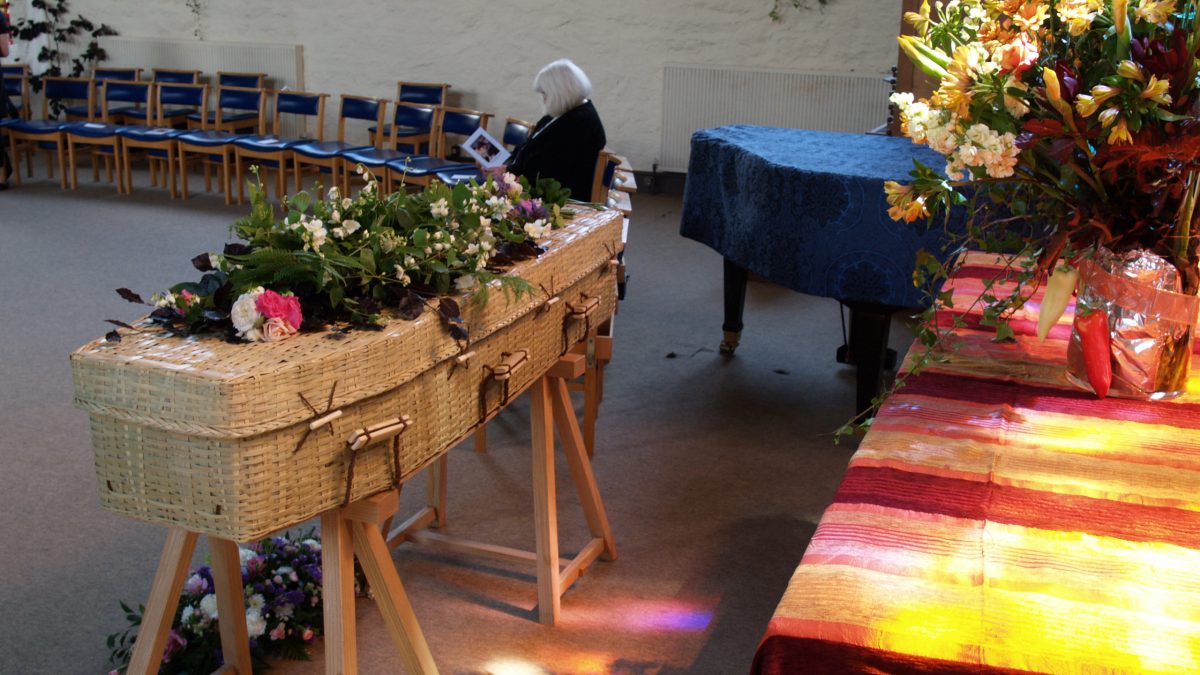It is the funeral ceremony that everyone remembers. The person who has died takes centre stage for the last time and those attending may begin to come to terms with the death and any difficulties left over, and also celebrate one, unique life.
Whether it be a crematorium or church service, a quiet moment together for the close circle of the person who has died by the graveside or a busy, packed event at a town hall with hundreds of people present.
Types of ceremony
A funeral ceremony is like a theatrical event – where the physical elements such as coffin, cars, place and flowers are matched with the content and the atmosphere created. By making the ceremony integral to the whole process of arranging a funeral, the close circle of the person who has died can draw on its own rituals as well as traditional funeral rituals to create a personal experience to say their farewells.
And, of course, not everyone wants an unconventional funeral. The beauty and atmosphere of churches, the liturgy, the act of singing together, radiate a sense of ancient ceremony and ritual bringing comfort to many, and this may be enough.
But when the close circle of mourners are invited to light a tealight and place it on the coffin, weave a flower into a woven coffin or to leave their places and look at the pictures and messages written on a cardboard coffin, a new sense of participatory ritual is involved. It becomes their event.
Click here to read more about Religious, Unaffiliated, Secular funerals.
Helping you create the ceremony that is right for your person
The key person who will help you work out what feels right and help you to create the service will usually be a vicar, priest or celebrant. A celebrant may be fully independent (of any religion or belief system), humanist, spiritualist or pagan.
They will help you combine the religious, spiritual and/or secular elements that will reflect the person who has died and the wishes of the close circle of the person.
At Green Fuse (sister company to Heart & Soul Funerals) we train people from all across the UK (and abroad) to become highly skilled independent celebrants. We teach and inspire them to listen carefully and, with warmth and kindness, inspire the bereaved towards the best funeral possible for their loved person – one that is moving and memorable, something to cherish always. And they will compose and conduct an appropriate, well structured and imaginative ceremony, from the heart.
What is a celebrant? An extract from a radio interview with Simon Smith of Heart & Soul Funerals
Watch a short video about Green Fuse trained funeral celebrants
Doing it yourself
While this is possible, and we will do do everything we can to support you, the close circle of the person who has died will need time and energy to put into it.
The main purposes of a funeral
A good funeral will fulfil the following purposes. Depending on the age of the person who died and the circumstances of their death, some may become more important than others, but all will be present in some way.
- To enable families and friends to understand, share and mourn their loss and remember and reclaim elements of their relationship with the person they may have lost suddenly or to illness or distance perhaps years ago.
- To illuminate and give thanks for the life of the person who has died. A good funeral nourishes and warms us as we interweave and share stories, memories, music, poetry, sadness and humour amongst the community of family and friends who loved the person.
- To confirm the reality of the loss and say goodbye to the physical form of the person who has died, and ask for the safe transition of the spirit or soul into whatever is believed to lie beyond, helping those left behind to achieve closure.
- To help the close circle if family and friends to take comfort from each other, initiate their grieving process and find a new sense of being in a world that has irretrievably changed.
- To send off the person who has died to whatever lies beyond this world, according to their beliefs.
- To put the death into a broader context of life and death.
- To dispose of the body.
Click here to read more about Religious, Unaffiliated, Secular funerals.


